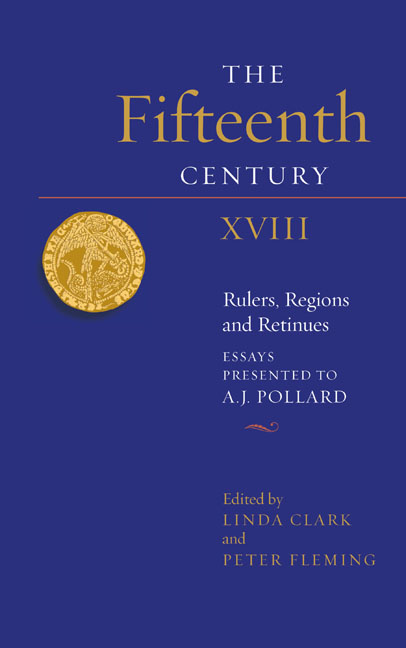Contemporary and Near-Contemporary Chroniclers: The North of England and the Wars of the Roses, c.1450–1471
Published online by Cambridge University Press: 24 November 2020
Summary
Traditionally, the Wars of the Roses are said to have begun with the first battle of St. Albans in May 1455. In fact, it was not much of a battle at all, and A.J. Pollard for one would have us downgrade it to a preliminary skirmish, no more than a prelude to the sustained fighting that broke out four years later in 1459. Nevertheless, it has a certain significance, particularly for the north of England. Two prominent northern lords, Henry Percy, second earl of Northumberland, and Thomas, Lord Clifford, were killed in the action, while two others, Richard Neville, earl of Salisbury, and his son, Richard, earl of Warwick, not only survived but went on to play prominent roles in the short-lived Yorkist administration that followed; moreover, the battle served ominously to confirm magnate divisions in the north that were to dominate its history thereafter until 1471, if not beyond.
Even before 1455, the Neville/Percy feud, very much a northern affair, had shown its lethal potential for disrupting and dividing northern society, for both the Nevilles and the Percys were not only powerful men in their own right but also capable of attracting very considerable support from lesser magnates and greater gentry. The Nevilles had their roots in the far north of England, in the palatinate of Durham, and by the time he died in 1425 Ralph Neville, first earl of Westmorland, had greatly enhanced his family's power and prestige. Following his death, however, the elder branch of the family found itself increasingly eclipsed by the younger branch, the Nevilles of Middleham, led by the earl of Salisbury: indeed, for several decades after 1425, mutual antagonism characterised their relations. By 1450 the Middleham Nevilles had clearly become the most powerful aristocratic family in northern England, both in terms of territory and dependants, so much so that in the 1450s the earl of Salisbury could confidently expect backing from an impressive line-up of fellow northerners, ranging from baronial houses such as the Greystokes of Greystoke, the Fitzhughs of Ravensworth and the Scropes of Bolton to greater gentry families such as the Strangeways of West Harlsey, the Pickerings of Ellerton, the Haryngtons of Hornby (in Lancashire) and the Conyers of Hornby (in Richmondshire).
- Type
- Chapter
- Information
- The Fifteenth Century XVIIIRulers, Regions and Retinues. Essays presented to A.J. Pollard, pp. 65 - 80Publisher: Boydell & BrewerPrint publication year: 2020



